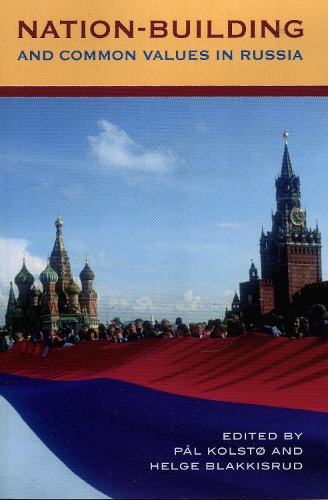
Nation-Building and Common Values in Russia
(Paperback)
Publishing Details
Nation-Building and Common Values in Russia
By (Author) Pl Kolst
Edited by Helge Blakkisrud
Contributions by Aidar Enikeev
Contributions by Ildar Gabdrafikov
Contributions by Grigorii V. Golosov
Contributions by Gulnara Khasanova
Contributions by Enver Kisriev
Contributions by Sergei Moiseev
Contributions by Iurii Shabaev
Contributions by Iulia Shevchenko
Bloomsbury Publishing PLC
Rowman & Littlefield Publishers
1st November 2005
United States
Classifications
Tertiary Education
Non Fiction
European history
Regional / International studies
947
Physical Properties
Paperback
390
Width 167mm, Height 228mm, Spine 31mm
567g
Description
Vladimir Putin has explicitly based his nation-building initiatives on the assumption that there exists a vast pool of common values in Russia that cut across ethnic and regional divides. Nation-Building and Common Values in Russia explores whether Putin is correct in his assumption, and to what degree a 'commonality of values' among the citizens of a country is a crucial element in the establishment of a common identity among them. The study raises two basic questions: Which values are actually common among various groups in Russia's population And which nation-building strategies are the Russian authorities actually pursuing, centrally and locally Sociological and political approaches to the study of nation-building and national cohesion in Russia are employed to answer these questions, and the findings contribute to a better understanding of nation-building processes in post-Communist Russia in general and of Putin's strategies in particular.
Reviews
This book provides a useful assessment of the extent to which Russians and non-Russians share a common set of values, which in turn allows readers to get a sense of the extent to which the Russian government's efforts to create a common political identity for all inhabitants of the Russian Federation will be successful. * Slavic Review *
This volume is excellent in that it considers identity-formation in some of the smaller and lesser-known regions. It also carefully and interestingly offers good descriptive evidence of key sources of both Russia's identity tensions and of its relative ethno-political stability. Particularly notable are interesting chapters on history textbooks and on the Orthodox and Islamic religious revival in post-Soviet Russia. -- Liliana Riga, University of Strathclyde * Nations and Nationalism *
Rich in empirical details. The individual chapters provide well researched accounts of the value structures in different spheres of life and the relationship of these different spheres to the process of nation building in Russia. -- Neil Melvin * Europe-Asia Studies *
Overall, it is well-written and well structured and provides an invaluable insight into the complexities of the Russian nation-building process. -- J. Glenn, University of Southampton * Seer *
Each case study provides a useful historical and cultural context into which the data from the survey on values are fitted. Highly recommended. * Choice Reviews *
Author Bio
POl Kolst' is professor of Russian and East European area studies, University of Oslo. Helge Blakkisrud is head of the Centre for Russian Studies, Norwegian Institute of International Affairs.
